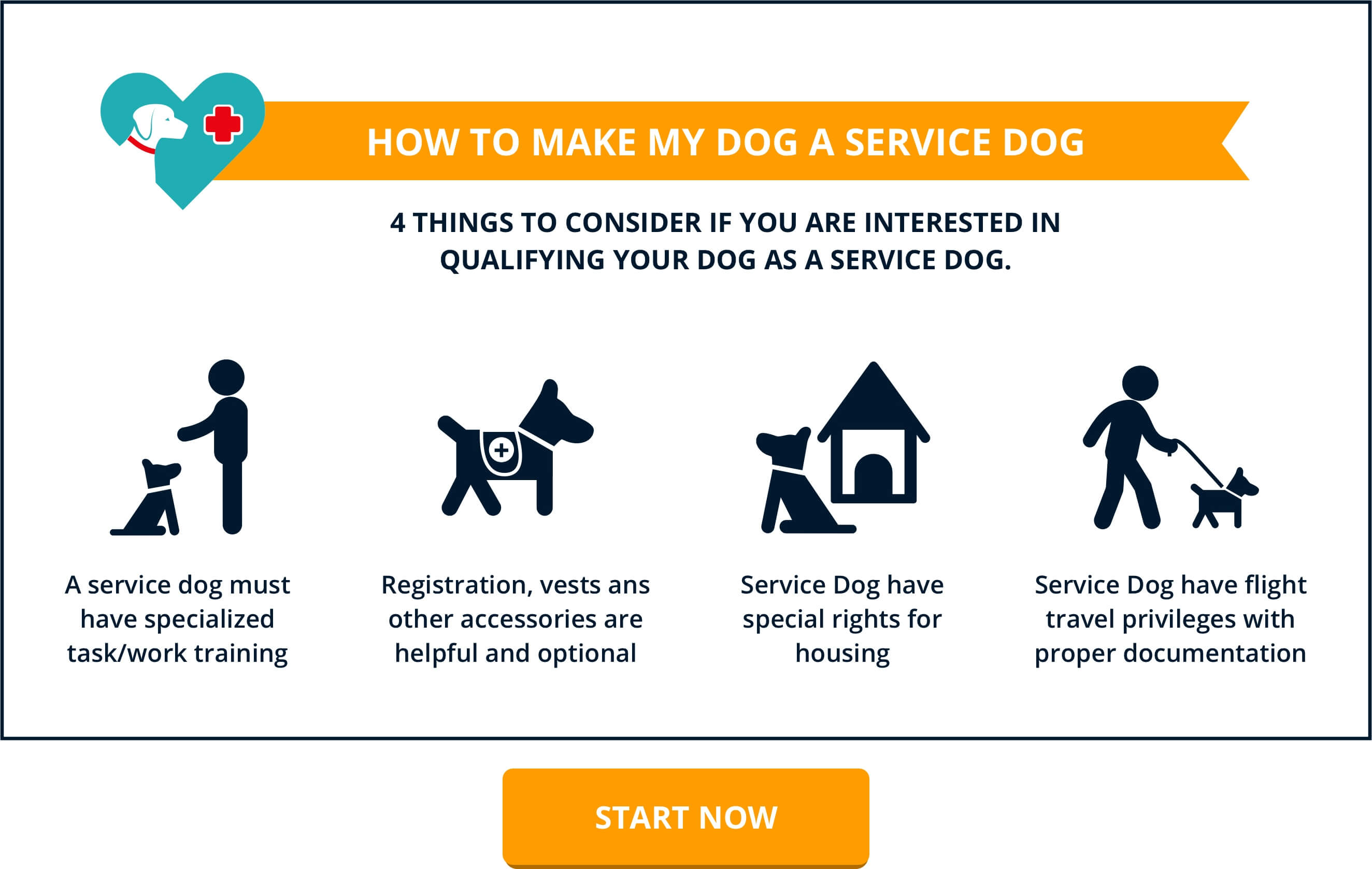
Fibromyalgia is a condition that affects approximately 4 million US citizens, mostly adults. This condition is characterized by pain all over the body, fatigue, sleep issues, and emotional distress. People who are dealing with fibromyalgia tend to be more sensitive than other people due to the anomaly in their state of continuous pain.
The symptoms of this condition, its cause, treatment and the way that service dogs can help people dealing with fibromyalgia are one of the topics that we will cover in the article.
What Causes Fibromyalgia?
Currently, there is no precise information about the exact cause of fibromyalgia. There are different factors, that may be considered triggers for people to develop this condition. Some of them are:
- an injury or infection;
- having an operation recently;
- giving birth;
- the death of a family member, a friend, or a partner;
- the end of a relationship or being in an abusive relationship.
In general, any event that strongly affects the individual on an emotional or physical level can lead to a development of fibromyalgia. Individuals at the age of 30-50 are considered most prone to this condition.
What Are the Symptoms of Fibromyalgia?
Symptoms that are most likely to occur in people dealing with fibromyalgia are:
pain all over the body, fatigue, tiredness, stiffness, numbness in hands and feet, sleeping issues, concentration and memory difficulties, stress, depression, anxiety, migraines, headache.
The following syndromes are also associated with fibromyalgia:
TMJ (Temporomandibular joint syndrome)- disorder of the jaw muscles and nerves. It may be caused by inflammation or injury of temporomandibular joint.
IBS (Irritable bowel syndrome)- this is a disorder of the digestive system. Its symptoms can be: diarrhea, constipation stomach cramps and bloating. These symptoms can last for different periods (days, weeks, months) and this syndrome is considered a lifetime condition.
What Factors May Lead to the Development of Fibromyalgia?
1. Age
According to researches, most people affected by this condition are adults and the older a person gets the bigger is the risk of developing fibromyalgia. Considering this we can say, that one of the risk factors is age.
2. Sex
Women are likely to develop this condition twice more often than men.
3. Stressful events
Events, causing Post Traumatic Stress Disorder (PTSD) can trigger fibromyalgia.
4. Obesity
5. Family history
Fibromyalgia is likely to be passed through genetics.
6. Arthritis
People suffering from Rheumatoid or Lupus Arthritis, are more exposed to the risk of developing fibromyalgia.
Fibromyalgia- Diagnosis
If you have some symptoms listed above and think that you probably deal with fibromyalgia, you need to consult a medical professional. In order to diagnose fibromyalgia, the medical history, examination, additional tests, X-rays and blood work may be required. Information about any medication that you currently take as well as about other diagnoses you have gotten may also be requested. After the medical professional confirms that the condition is fibromyalgia, a proper treatment will be prescribed. You are likely to be advised on whether the presence of a service animal will be beneficial for you and can mitigate your symptoms or not.
If a service dog is considered helpful for you, you may want to know more about the assistance that service dogs can provide for the benefit of people diagnosed with fibromyalgia.
Treatment
People diagnosed with fibromyalgia may need to take medication including antidepressants, pain relievers, medication to help them sleep, anticonvulsants, muscle relaxants and antipsychotics.
Alternative treatment may include:
cognitive behavioral therapy (CBT), psychotherapy, exercises for muscle strengthening, techniques for stress management, yoga, meditation, improving the sleep habits and sleep quality, massage.
Individuals dealing with fibromyalgia may benefit from the assistance provided by service dogs as well.
What Are Service Dogs and How Can They Help People Handle Fibromyalgia
Service dogs are dogs specially trained to perform tasks for the benefit of individuals with different kinds of disabilities- physical, mental, sensory, intellectual...etc. These dogs are a vital part of their lives and must be granted public accommodation rights, unless they behave inappropriate and cause damages.
Since individuals diagnosed with fibromyalgia experience chronic pain, they tend to have difficulties with many daily tasks, sometimes even with the most simple ones like picking up an object or even getting out of the bed. Service dogs can be trained to bring different objects, including medication, and put them on the table or another place in the house easy to access. Service dogs can press buttons, open and close doors, drawers, move objects so that they do not make the access to a certain place in your home is difficult, i.e. a pillow has fallen on the floor and you are unable to relocate it, due to the pain you are currently feeling. Service dogs can help their handlers stay on their feet and assist them as a balance device. They can help you go out of the tub, bring your clothes, or guide you to a safe place when you feel pain or panic attack while in public. If an individual feels severe pain and is unable to move, a wheelchair may be needed. Service dogs can be trained to fulfill even demanding tasks like pulling a wheelchair.
If your hands or legs are numb and cold, a service dog can warm them up through tactile stimulation and Deep Pressure Therapy. They also can sit on your lap, paw you, nudge you, and notify you about an oncoming event.
If you have a strong migraine and feel dizzy service dogs can be trained to determine these conditions before they occur or to assist you accordingly. They can prevent you from falling on the ground and protect your body. Also, they can dial 911 or alarm your housemate or family member that you are not feeling well.
Service dogs as well as Emotional Support Animals (ESA) and Therapy Dogs (the last two are not considered service animals, as they are not trained to perform specific tasks) can provide emotional comfort and relaxation. This is extremely important for people dealing with stress and anxiety as symptoms of fibromyalgia.
Since service dogs are individually trained to perform specific tasks, these tasks can be adapted to the particular symptoms that the person has. Feeling chronic pain can prevent people from doing many activities and having a fulfilling life. The presence of a service dog can alleviate the symptoms of fibromyalgia and help individuals return to their normal life. Their assistance can be provided in many ways- physical and emotional.
How to Choose the Right Service Dog
As we already mentioned above, a service dog can perform multiple tasks, that is why you need to determine first what your needs are and what dog as an individual will help you the most based on your symptoms.
If you feel severe pain and have balance problems, you may need to look for a dog with a strong physique and a calm temperament.
If your symptoms are related to your emotional state, you can choose a smaller dog breed, that can provide you with tactile stimulation and loves to cuddle.
To be easy-going, trainable, intelligent, and balanced are essential characteristics that every service dog must possess.
Along with your needs, you need to consider the dog’s needs as well. If he/she needs a lot of exercise and a lot of space to run, and explore, your symptoms may not allow you to accommodate the needs of your furry friend. However, in this case you can be the user of the service dog and a family member/relative/friend can be the handler.
As we mentioned several times in our articles, a service dog needs to be evaluated as an individual when it comes to temperament and personality. The most important condition for a successful handler-dog team is the strong bond between both sides.
Where to Get a Service Dog
Due to the expression of the symptoms that varies from person to person you may want to train your own service dog to suit your needs. There are a lot of online training courses that may help you. For more information, you can click here. US citizens are allowed to train their own dogs, since ADA (Americans with Disabilities Act) that regulates the status of service animals provides them with this opportunity:
“People with disabilities have the right to train the dog themselves and are not required to use a professional service dog training program”.
Of course, you can always contact a professional trainer or an organization near you. Many organizations can provide you with a trained service dog or train your dog to become a service dog. In this case, you have to be prepared to pay thousands of dollars as the energy and time invested in the training process as well as the raising costs determine the high price. Some organizations offer payment options or fundraising in case that the costs are prohibitively high for some handlers.
You can also adopt a dog from a rescue shelter and then train him/her yourself. Rescue animals tend to attach to their handlers and love them even more.










